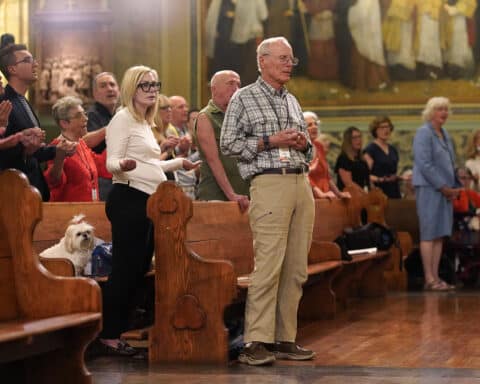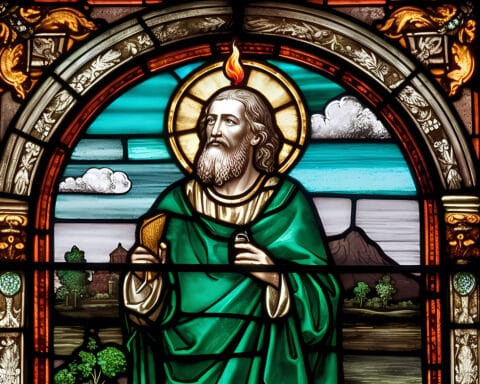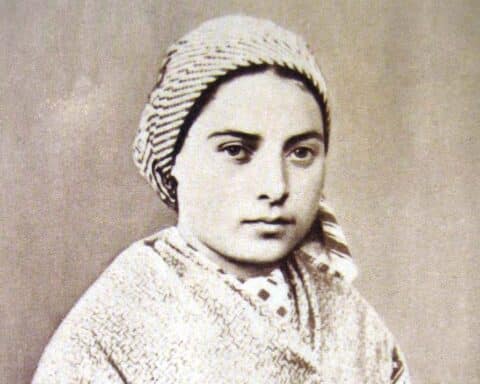Among the exacting Church criteria used for selecting someone as a saint is clear indication that the person being considered lived a life of heroic virtue — that is, they lived in concert with the theological virtues of faith, hope and charity, and with the cardinal virtues of prudence, justice, fortitude and temperance. One saint, who was a model of all such virtues, is St. Martin de Porres.
Born in Lima, Peru, in 1579, his full name was Juan Martin de Porres Velazquez, the son of a Spanish nobleman, Don Juan de Porres, and a freed slave, Anna Velazquez, who never married. Don Juan de Porres pretty much abandoned the family; Martin and his sister and mother were left to fend for themselves in abject poverty. No father present and living in poverty was not a good beginning for a child, neither then nor now. But Martin, gifted by the Holy Spirit, was elevated from these humble beginnings to become a saint — the first Black saint of the Americas.
From barber to brother
Martin received only limited schooling and, at age 12, became a barber’s apprentice. In that era, a barber not only cut hair but also provided basic medical skills. The child soon had a meager income, most of which he gave to the needy, as very early in his life he developed a special affinity for the poor, the sick and abandoned.
Called by God from a young age, when he was 15, Martin sought to join the Dominican religious order. Discrimination was present in the 16th century, and Blacks, Indians and their descendants were barred from joining religious orders. Martin pleaded with the prior of the Dominicans of Holy Rosary in Lima to allow him to live in the community where he would perform any menial task.
The prior agreed and Martin took on the most beggarly duties and in return was allowed to live in the priory and wear a habit. Not everyone in the community agreed with this arrangement and Martin was, more than once, verbally abused, mocked, called a half-breed and black mulatto dog; his response was immediate forgiveness, believing that the offender was a much better person than Martin could ever be.
| A Eucharistic Saint |
|---|
| Pope Benedict XVI, then-Cardinal Joseph Ratzinger, explained that St. Martin de Porres recognized the Lord in the tabernacle and the needy: “Martin lived from the adoration of the Lord present in the Eucharist, passing entire nights in prayer before the crucified Lord in the tabernacle, while during the day he tirelessly cared for the sick and assisted the socially outcast and despised, with whom he, as a mulatto, identified because of his origins. The encounter with the Lord, who gives himself to us from the cross, makes all of us members of the one body by means of the one bread, which when responded to fully moves us to serve the suffering, to care for the weak and the forgotten.”
— Lecture by Cardinal Ratzinger on June 2, 2002, on the “Eucharist, Communion and Solidarity” |
After nine years, the prior defied the law and Martin took the religious vows as a lay brother. Among Martin’s responsibilities was to distribute alms to those in need. Most of the time, the priory could not provide enough food and clothing, so Brother Martin took to the streets begging from the rich to help the destitute. Successful in this effort, he worked to provide not only life-giving essentials but also found ways to assist people in carrying the burdens of day-to-day life — especially the underprivileged.
He lived in the manner of the good Samaritan, unable to pass by anyone in need. His charity consisted of not only distributing material goods but he gave of himself to everyone he contacted no matter their social standing; he became known as Martin of Charity. When the slave ships from Africa arrived, filled with suffering black prisoners, he would go aboard providing medical attention and giving hope to those poor souls who had been in chains, living in squalor for weeks.
Humble in both manner and action, Brother Martin lived the life of a Dominican lay brother seeking no honor. He treated the poor and the rich with integrity, saw value in every person, stood up for equal rights and his sense of justice became well known. In his ministry to people of many different races and social statuses, he became aware that without justice there can be no peace and he championed justice among all he confronted.
Martin so loved God that all these virtues were for him second nature. What he urged, was that those he befriended follow the teaching of Jesus, offer their cross to him and live in harmony and love with each other. Our world today would profit from applying the virtues of Martin de Porres.
Often, his brothers in the priory objected to Martin’s charity. It was not unusual for Martin to bring some homeless person into the priory and even give his bed to that person. On one such occasion, the homeless soul was covered with open sores and one of the brothers objected. Martin reportedly responded: “Compassion, my dear brother, is preferable to cleanliness. Reflect that with a little soap I can easily clean my bed covers, but even with a torrent of tears I would never wash from my soul the stain that my harshness toward the unfortunate would create.”
On another occasion, during an epidemic of the bubonic plague, he brought a sick Indian to the priory for medical attention even though the superior had issued strict instructions that no one from the outside was to be allowed inside for fear of transmitting the disease. The superior challenged Martin for violating the rule. The future saint argued: “Forgive my error, and please instruct me, for I did not know that the precept of obedience took precedence over that of charity.”
Spent his life in Lima
Serving as a missionary in a foreign land where he could become a martyr for Christ is what he wanted most; instead, Martin remained in Lima, serving others. Besides assisting the poor and homeless, he spent much of his life in the priory infirmary where he treated his brothers for all sorts of illnesses. At one point, he was the catalyst for establishing a children’s orphanage and hospital, a first in Lima.
He had many gifts: some say he could bilocate, be in two places at once, that he could pass through locked doors, that he miraculously cured the ill. Others insist that he could talk to animals. With his sister’s help, he established a hospital for dogs and cats. He loved every creature and would not eat meat.
At age 60, he succumbed to a fever and died on Nov. 3, 1639. Thousands from every social class attended Martin’s funeral. It would be 323 years before he was recognized as a saint. Part of this delay was because his sanctity was known to few outside Peru. But the people of Lima recognized how Martin practiced the words of Jesus: “For I was hungry and you gave me food, I was thirsty and you gave me drink, a stranger and you welcomed me, … ill and you cared for me, in prison and you visited me” (Mt 25:35-36).
Canonized 323 years after his death
Martin’s humble, virtuous life was acknowledged at his canonization by Pope St. John XXIII on May 6, 1962: “He loved men because he honestly looked upon them as God’s children and as his own brothers and sisters. Such was his humility that he loved them more than himself and considered them to be better and more righteous than he was. … It is deeply rewarding for men striving for salvation to follow Christ’s footsteps and to obey God’s commandments. If only everyone could learn this lesson from the example that Martin gave us.”
He is the patron saint of barbers, social justice, interracial relations and others. Hospitals, churches, religious orders all over the world bear his name.
D.D. Emmons writes from Pennsylvania





